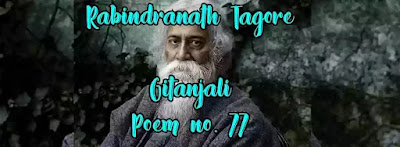Also Read
I Know thee as my God and stand apart - I do not know thee as my own and come closer. I know thee as my father and bow before thy feet - I do not grasp thy hand as my friend's.
I stand not where thou comest down and ownest thyself as mine, there to clasp thee to my heart and take thee as my comrade.
Thou art the Brother amongst my brothers, but I heed them not, I divide not my earnings with them, thus sharing my all with thee.
In pleasure and in pain I stand not by the side of men, and thus stand by thee. I shrink to give up my life, and thus do not plunge into the great waters of life.
Summary
The song is a lyric of humanity. Serving mankind and performing duties brings you near Him. He is near you in the form of your friends and brothers and to love them is to love Him. The poet doesn't realize that He is to be found within the humble humanity. He worships Him as a father but dares not to love him and grasp His hand as a friend, He doesn't realize Him as a brother, as one of the humble people with whom we live and work in our daily lives.
The poet pays no heed to them nor does he divide his earning among his fellow beings. The devotee must not approach God with fear but love. One must not stand apart from God but look upon Him as one's own and try to come closer to them. One must look upon God as one's friend and grasp His hand lovingly, and not merely regard Him as a father and bow before His feet. One must take God as one's comrade and clasp Him to his heart. One should stand by the side of one's fellowman in pleasure and pain, for that is the only way in which one can hope to stand by the side of God Himself. One shouldn't be afraid of death, for death is the gateway to the sea of eternity. It is only after death that the human soul returns to the divine and becomes one with Him.
Critical Analysis
Tagore was from an aristocrat family but he always accepted the human dignity and equality even for the lowliest. Tagore castigated or criticized the centuries old Indian tradition of exclusiveness and isolation as practised by the higher classes. He was influenced by the principles of the Brahmo Samaj. He felt man cannot ignore his fellowmen and still hope to realize God, for God is with the tiler of the soil, and the humble road maker, rather than with priest and the prince. Unlike other poems the poet fears from death. Somewhere he is ready to garland death and now he is fearing from taking a dip in the sea of eternity.
"I know thee as my God and stand apart - do not know thee as my own and come closer. I know thee as my father and bow before thy feet - I do not grasp thy hand as my friend's"
The poet deplores the fact that it is a pity that instead of looking upon God as one's friend man bows before Him, in fear. Poet stressed that love God as a lover, brother and friend or love them to love Him. He is in mankind. He is as humble as a poor. He is as loving as a friend and He is as much caring as a brother. The humanism is the way to love Him, reach upto Him. To live life of humanity, to share the sorrows and joys of fellowman and to help them is to love God.
Annotations
Apart: aloof. Grasp: holding with love. Clasp: holding tightly. Comrade: companion. Stand by: supporting, help. Shrink: hesitate. Great water of life: sea of eternity, way to God after death. Plunge : drown, to dip.
